THE FIRST PART OF BIOGRAPHY AND DISCOGRAPHY IN YEARS (1970-1984).
THE ARTICLE IS ALSO AVAILABLE IN DIGITAL FORM (20 PAGES) AND IS ENRICHED WITH LOTS OF BEAUTIFUL PHOTOS. TO VIEW IT, CLICK ON THE BUTTON LOCATED BELOW.
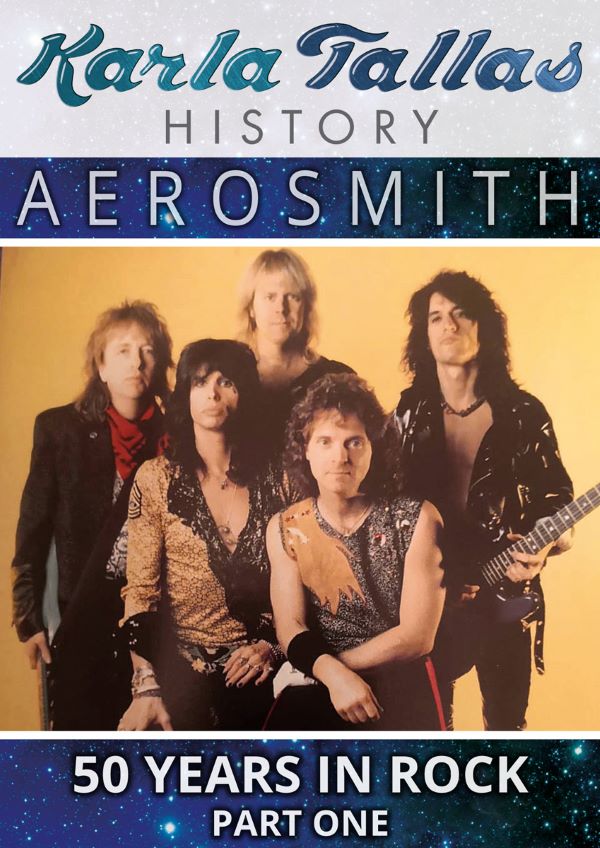
H I S T O R Y
America’s greatest rock and roll band of all time, AEROSMITH will celebrate 50 years on the music scene in 2020. Another reason to celebrate could be in the year 2021. By then, 50 years will have passed since the guitarist Brad Whitford joined the band, forming their strongest and most stable line-up which has been performing together until today. Without this line-up, even the most enthusiastic of fans could not imagine AEROSMITH: Steven Tyler – vocals, Joe Perry – lead guitar, Brad Whitford – rhythm guitar, Tom Hamilton – bass and Joey Kramer – drums.
If we do believe in the theory that many things in life are determined by destiny, and we can’t change its framework, but we are able to influence and change many things, we will surely agree that there are connections that are meant to happen in advance for various reasons. Undoubtedly, this scenario played a part in the lives of the BEATLES, THE ROLLING STONES, LED ZEPPELIN, as well as AEROSMITH and many others. I am convinced that if any of these five people left, it could significantly influence the overall direction and development of the band and maybe everything would have been completely different. The proof of this saying is evident in the darker period of the band when Joe Perry left for several years, followed shortly by Brad Whitford. AEROSMITH forms an entity and is also a trademark that works. Individual members may also have their solo projects, but so far, none of them has managed to achieve the effect they have been getting together for decades.
Over a period of five decades, the band members have gone through everything possible to experience in this world, together as well as each of them separately. Ascension alternated with falls, in both career and mutual relationships. Their journey together, in both positive and negative terms, looks like riding on one of the craziest rollercoasters in the world. The overall situation in the band was undoubtedly influenced by the cruelty of the music show business and the greed of managers eager for big and fast profits, as well as the lack of grasp of fame. Sold out concert stadiums and life in luxury hotels alternated with life at rehabs, often in a lot of dramatic circumstances. Many continually question how it is even possible to survive the unimaginable quantity of drugs and alcohol that musicians enjoyed to the fullest, especially in the 1970s and 1980s. They spent much bigger amounts of money on their addiction than an ordinary person would be capable of earning in one human life. Yet the fortunes of fate stood on their side, and they were literally able to rise from the ashes and, as a Phoenix, rise up and shine even more and even further.
AEROSMITH musically cross the boundaries of different genres. The basis from their beginnings are blues rock – hard rock with an overlap into funky, R&B, boogie, pop and, thanks to cooperation with RUN DMC, also rap, but sometimes also classical music. There is a strange working rule in the world. The greater the versatility the artists demonstrate, the more controversy and speculation they attract. If an artist or a band focuses on one particular genre, the group of fans mostly consists of the fans of that particular genre. If the band is not too limited and also dares to go with the times and certainly does not avoid commercial success or the many compromises associated with it, its options are of course diametrically different. As in the case of AEROSMITH, who attract the attention of the audience from the weakest social strata to the most influential and richest personalities on our planet. They get the biggest attention from the women’s audience, and most often, especially in the past, they were surrounded by renowned beautiful models and shining Hollywood stars. This, of course, brings tremendous adoration and respect, but also a lot of hate and condemnation. But no one will deny AEROSMITH their uniqueness and contribution to the world music scene. In their discography, we do not find a single album that would not offer at least two brilliant pieces.
With over 150 million albums sold all over the world, twelve multi-platinum albums, eighteen platinum and twenty-five gold records, they have been inducted into the Rock’n’roll Hall of Fame, won countless awards including four Grammy Awards, twelve MTV Awards, six American Music Awards and four Billboard Awards. Steven Tyler and Joe Perry were inducted into the Song Writers Hall of Fame. In January, AEROSMITH will be honored for their worldwide philanthropic endeavors as they will become personalities of the 2020 MusiCares. Worldwide, they have a huge fan base known as Blue Army.
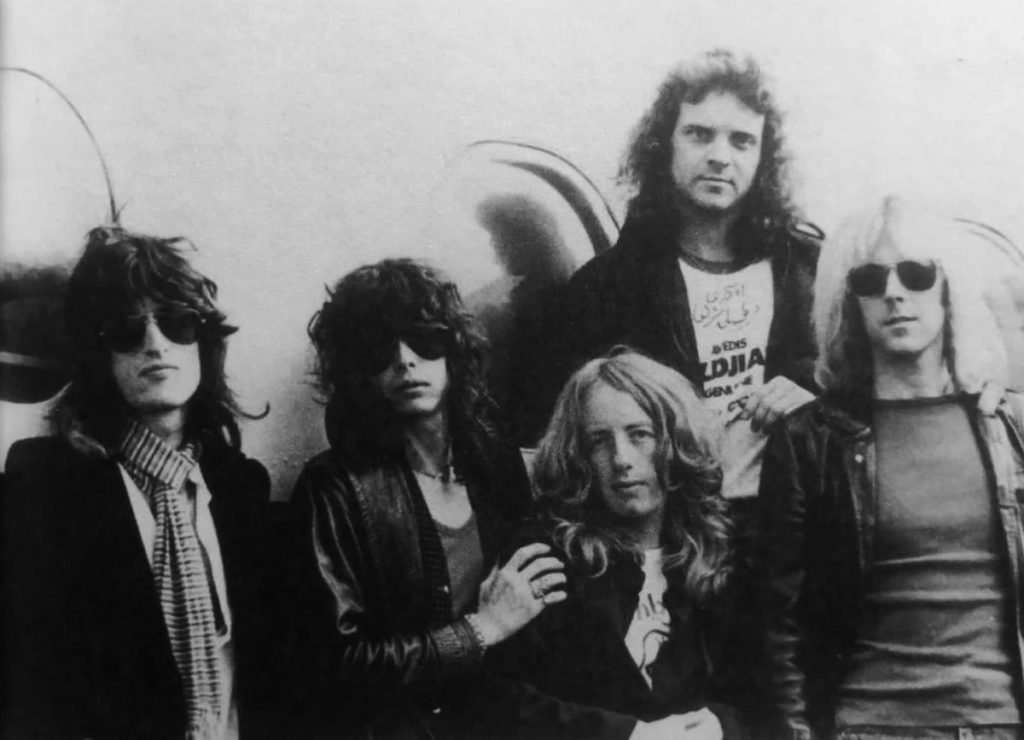
“A ‘smith’ is a master craftsman. AEROSMITH would be the masters of getting you off the ground and getting you up, getting you high. I wrote it all over my books in school, and from then on, that was the name that stuck with me.”
(JOEY KRAMER)
1970–1972
AEROSMITH was founded in the summer of 1970 in Sunapee, New Hampshire. Steven Tyler spent his summers there with his parents in their summer house, which they called Throw-Rico. Before getting to know Joe Perry, Steven had had plenty of experience as a musician. For example, before the formation of AEROSMITH, he was a member of the band THE CHAIN REACTION. One summer, Joe Perry made his money at Sunapee at a local restaurant. Joe Perry and Tom Hamilton had played together for some time in JAM BAND. Joe knew about Steven and, as he says, Steven was well known by everyone in the whole area. One day, he parked outside Steven’s house and invited him to a concert of his band JAM BAND. They were playing at the local Barm Club and Steven came over to see them that evening. In their setlist, there were mostly cover versions of all of their favorites and among others there was also the “Rattlesnake Shake”, the famous FLEETWOOD MAC song, which AEROSMITH released in 1991 on the compilation CD box “Pandora’s Box”. Shortly afterwards, Steven, Joe and Tom started jamming together and were joined by Joey Kramer (attending the same high school as Steven) and Ray Tabano. Before the end of the year, five determined young musicians eager to conquer the big world of rock, moved to Boston, Massachusetts, where they together rented an apartment on 1325 Commonwealth Avenue. AEROSMITH performed their first gig ever on November 6, 1970 at a very unusual place for rock and roll. Joe Perry’s mother managed to arrange a performance at the Nipmuc Regional High School in Mendon, Massachusetts. Shortly after, Brad Whitford replaced Ray Tabano and the line-up started to rehearse for live shows.
The credit for the band’s name is attributed to drummer Joey Kramer who, in his biography “Hit Hard”, recalls how he came up with the name AEROSMITH as a schoolboy. He and his friend talked about how he would put the band together and how big and famous it would become. His friend asked him what his band would be called, and he replied that he did not know and started to think about it. When they listened to Henry Nilsson’s “Aerial Ballet” album, he was inspired by the word aerial and began experimenting with the word aero. The names such as Aerocross, Aerofish, Aerocandle, Aerophone were spinning in his head and, suddenly, the name AEROSMITH came out. Joey adds: “A ‘smith’ is a master craftsman. AEROSMITH would be the masters of getting you off the ground and getting you up, getting you high. I wrote it all over my books in school, and from then on, that was the name that stuck with me.”
“You didn’t get a record contract if you were a band that lived in Boston. You had to go to New York and audition.”
(JOE PERRY)
In August 1972, AEROSMITH signed their first record deal with Columbia Records with the company’s president, Clive Davis. At that time, Clive Davis was one of the biggest names in the music industry. Leber – Krebs’ management then sent him a demo that impressed him so much that he went to the prestigious Max’s Kansas City, a rock club in Manhattan, New York to see AEROSMITH. Joe Perry adds: “You didn’t get a record contract if you were a band that lived in Boston. You had to go to New York and audition.” Clive Davis was impressed by the combination of raw blues and youthful arrogance, so he contracted $ 125,000 with the band management. AEROSMITH was put under a lot of pressure and had to work hard. From that time, AEROSMITH was permanently on tour or in the studio, essentially until 1979.

“Once the album was out, we owned Boston!”
(STEVEN TYLER)
1973
The self-titled debut album, “Aerosmith”, was released on Columbia Records on January 5, 1973. The recording was chosen at Intermedia Studios which was, according to Tom Hamilton, a real Frankenstein’s lab of a place. With a mixing desk that looked like it was made of cardboard with knobs the size of car headlamps. For yet inexperienced musicians, however, it was a place full of new possibilities and, moreover, it was still within their budget. The band recorded the whole album in a mere two weeks. Produced by young producer and musician Adrian Barber, best known for producing the BEATLES – “Live at the Star-Club in Hamburg, Germany” (1962), he also produced the debut album ALLMAN BROTHERS and “Loaded” by VELVET UNDERGROUND.
The first AEROSMITH release can be considered a very good start in the music industry. The debut offers some brilliant moments, and the three songs from the album – “Dream On”, “Mama Kin” and “One Way Street”, are up among the absolute classics in rock history. As an opener, AEROSMITH couldn’t pick a better piece than “Make It”. The lyrics for this song were written by Steven Tyler and are a kind of mirroring of his longing for fame. Since childhood, he had imagined full stadiums of screaming fans, and saw no other option. At the same time, this song is also a precursor of future success. He wrote the lyrics in the backseat of a car on his way from New Hampshire to Boston, wondering what the lyrics of the song would be like to start a concert if they were given the opportunity to open for THE ROLLING STONES. Steven Tyler loved the song “Mama Kin” so much that he made a tattoo of MA KIN on his arm. Steven Tyler wrote the first big AEROSMITH’S hit “Dream On” on his dad’s piano in the Throw-Rico living room in Sunapee at the age of seventeen. It was around four years before AEROSMITH was formed. Right on the first album, he showed his qualities as a singer, song writer, lyricist and musician. Although he himself admits, at the time he wrote “Dream On”, he knew nothing about composing songs. The song is undoubtedly also inspired by the time when Steven, as a child, was lying under the piano of his father, Victor Tallarico, who taught classical music and played the piano, and Steven virtually inhaled the music of great classical giants such as Claude Debussy. The lyrics of the song are timeless in the true sense of the word. We would expect something like that from an experienced personality mapping his life, rather than them being written by a young teenager. Rock power ballad “Dream On” with an overlap into classical music is as emotional today as it was in the early years of the band’s career and rightfully belongs to undying hits as well as “Stairway to Heaven” by LED ZEPPELIN. One day, Steven Tyler found a suitcase in front of the apartment with $ 1,800. He bought the RMI electric piano for them and first played “Dream On” in front of the audience with. It was the first single to immediately score in various charts, and it was the only track they’d put on radio back then. Another first status belongs to the song “Movin’ Out” which is the result of the first mutual collaboration of the now legendary duo Tyler / Perry, also known as the TOXIC TWINS. The album is completed by one cover version on the album, “Walkin’ the Dog” by Rufus Thomas. Perhaps surprisingly, AEROSMITH did not choose a song from any of their favorites such as the BEATLES, THE YARDBIRDS or THE ROLLING STONES. Even though the song is related to THE ROLLING STONES in some way. They also included it on their debut album in 1964. But AEROSMITH was introduced to it by the drummer Joey Kramer who played the song for several years in various revue shows. It is the only cover version that AEROSMITH included in their concert set back then. The musicians were rightfully satisfied with the results of their first recording. With sales of 40,000 copies at the time, which mainly included their audience in New England, the chances of international success over night disappeared, but as Tyler comments: “Once the album was out, we owned Boston!”
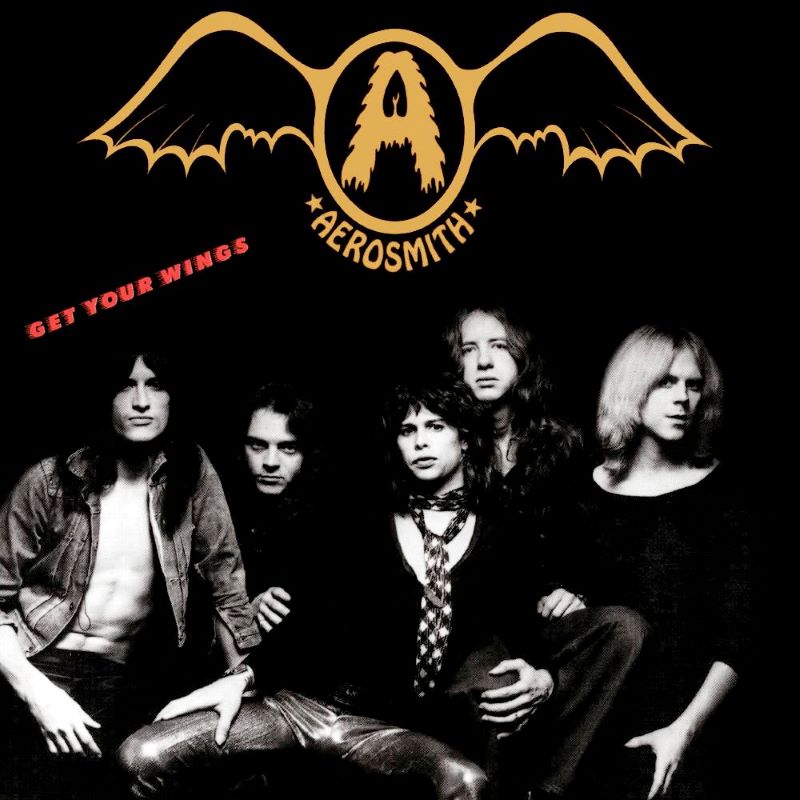
1974
On March 1, 1974, the second studio album called “Get Your Wings” was released, and it meant a few major changes and a significant step forward for AEROSMITH. From a small unknown studio in Massachusetts, the band headed straight to New York, to the famous Record Plant, influenced by the visits of their heroes THE ROLLING STONES and LED ZEPPELIN before. While the first album, with the exception of the ballad “Dream On”, is about pure blues rock that the musicians were inspired by the most, the second album is musically more varied and sophisticated and also enriched with acoustic guitars, saxophone and harmonica. The cover of the album features the legendary winged band logo for the first time. Ray Colcord and Jack Douglas, who were also good friends in private, were responsible for production under the supervision of experienced producer Bob Erzin. He had already made successful productions for ALICE COOPER, for whom he produced the highly successful albums “Billion Dollar Babies” and “School’s Out”. Although Bob Erzin has a big name built in the music business, it was Jack Douglas who made a major connection with the band that lasted almost a decade and bore fruit in their studio efforts. He immediately got along very well with the band and, as Brad Whitford says, actually became its sixth member.
Although AEROSMITH had to wait for huge success until the next album, “Get Your Wings”, was made, the collaboration with Jack Douglas bore fruit in the four essential songs of the album. These are still among the most successful pieces in their discography and among the band’s greatest hits: “Same Old Song and Dance”, “Lord of the Thighs”, “Seasons of Wither” and “Train Kept a Rollin’”. The original authors of “Train Kept A Rollin’” are Howie Kay, Louis Mann and Tim Bradshaw. Johnny Burnett’s ROCK AND ROLL TRIO were the first who made the song famous in the 1950s. AEROSMITH has received attention from their idols THE YARDBIRDS, who recorded their own version on the album “Having a Rave Up”. LED ZEPPELIN also started their early shows with “Train Kept a Rollin’”. To write the ballad “Seasons of Wither”, Steven Tyler was inspired by the typical gloomy autumn evening New York, while missing summer time in Sunapee. For Joe Perry, this is his favorite ballad in AEROSMITH discography. After the title of the song “S.O.S.”, many might imagine a call for help, but in the case of AEROSMITH’s song, the words ‘same old shit’ are hiding behind the shortcut. The sales of the second album were significantly better (500,000 copies), so the musicians were motivated enough to start working on the next album.
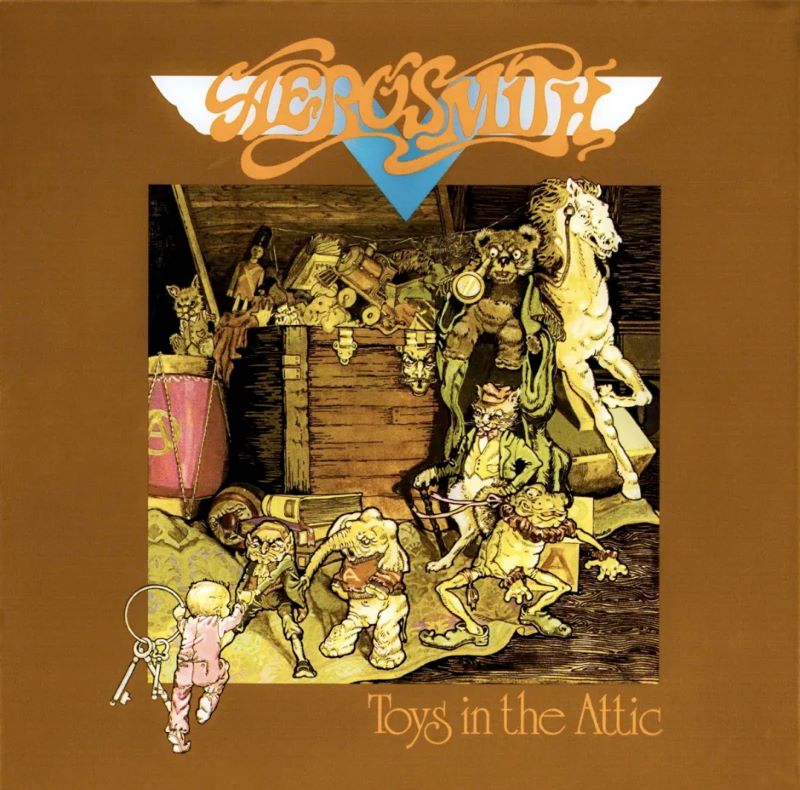
“That’s what I always admired about the BEATLES. They’d come out and release “Sexie Sadie” and then go into “Helter Skelter”. That’s the kind of thing I’d like to do – four or five rockers, then go into a ballad that takes you to another land and then back to another gasser. And that’s what this new album is about.”
(STEVEN TYLER)
1975
In the case of the third studio album of AEROSMITH – “Toys in the Attic”, the old saying “third time lucky” rings true in spades. After completing a tour to support the album “Get Your Wings” throughout the United States, AEROSMITH set out for the second time to the Record Plant in New York. Before recording, they had prepared material for a new album, written on the tour, and before coming to the studio, they were sure that this could be one of their breakthrough albums.
“Toys in the Attic” completely changed AEROSMITH’s reputation and ranked them among the world’s top rock artists. Jack Douglas was the main producer this time. According to the band members, he was very open to working in the studio; he liked to experiment and did not resist trying new ideas. “That’s what I always admired about the BEATLES. They’d come out and release “Sexie Sadie” and then go into “Helter Skelter”. That’s the kind of thing I’d like to do – four or five rockers, then go into a ballad that takes you to another land and then back to another gasser. And that’s what this new album is about,” Steven Tyler stated. Jack Douglas managed to transmit the atmosphere of live shows into a studio recording and authentically capture the energy and determination with which AEROSMITH perform. It’s best captured in the title “Toys in the Attic” which, according to Joe Perry, is a benchmark rock and roll song for AEROSMITH and is, to date, one of their most accomplished anthems. The album clearly defines another in the collection of the greatest hits “Walk This Way”, already dominated by the Joe Perry insistent guitar riff which perfectly fits into the atmosphere of the song with a typically teenage sexual text. This is the first album which, except for Tyler / Perry, includes also other band members participating as song writers.
“I had my part, but I was too shy to say, hey, let’s work on it. But somehow, we had one extra day in the studio at the end, and Jack said, ‘Anyone have anything we can jam on?’ And so, this one made it at the last minute. I remember showing this riff to Steven a couple of times during the “Get Your Wings” session, and he just didn’t like it. My immediate reaction was just to forget it. But one day, we started the riff at a different point, and it shed a whole new light on it,”
(TOM HAMILTON)
Among the classics and the absolute top tracks of AEROSMITH’s discography is definitely also “Sweet Emotion”, which was the first single from this album and, paradoxically, was the last on the record. “I had my part, but I was too shy to say, hey, let’s work on it. But somehow, we had one extra day in the studio at the end, and Jack said, ‘Anyone have anything we can jam on?’ And so, this one made it at the last minute. I remember showing this riff to Steven a couple of times during the “Get Your Wings” session, and he just didn’t like it. My immediate reaction was just to forget it. But one day, we started the riff at a different point, and it shed a whole new light on it,” recalls Tom Hamilton, who has since been called Tom “Sweet Emotion” Hamilton.
He brought an Eastern atmosphere in combination with all American boogie to the song. The lyrics were taken care of by Steven Tyler, who explains: “A lot of stuff I wrote in the old days just came out of anger. “Sweet Emotion” is about how pissed off I was at Joe’s ex-wife Elyssa, and all the other frustration at that time.” Worthy of note is for sure the first song ever written for AEROSMITH by Brad Whitford, rough and metallic “Round and Round”. Up until that point, certainly the heaviest song the band released, but also proof the band was open to experiment and was not afraid to enter the lesser known spheres. The track is darker, in places psychedelic, and more than classic rock and roll, it is reminiscent of the early BLACK SABBATH. The whole album concludes with the sentimental ballad “You See Me Crying” from Tyler’s time in THE CHAIN REACTION. “Toys in the Attic” gave the band a stardom status as well as access to first-class drugs. Already at the end of 1975, they had their first platinum album for 1,000,000 copies sold. After the obstacles with the first album were overcome, they became the number one artist with Colombia Records. They became bigger than BOB DYLAN, PAUL SIMON, BARBRA STREISAND or BRUCE SPRINGSTEEN. Brad Whitford remembers this period as a time of everything clicking in to place.

1976
After the huge success of the previous release, AEROSMITH was under great pressure. Expectations were huge. They were expected to maintain the set standards, and if possible, raise them even higher. Due to the great success of “Toys in the Attic”, AEROSMITH could finally afford space for pre[1]production, and to this end, they took advantage of the comfortable Wherehouse environment in Waltham, Massachusetts.
The musicians fully enjoyed the glory, and in addition to contracts with the record label and management, they concluded a third contract with the devil himself who was uncompromisingly soon, and for a long period of time, taking his reward. It is hard to say whether the devil himself was not behind the glory in the end and was not the one whispering advice to the managers and businessmen. The drugs then only act as a tempting and irresistible trap, dragging their prey down to the real bottom with the intention of obscuring the mind as much as possible and not letting it perceive things in their true light. At this stage, it is easy to trap the mind, and then the artists themselves have no chance to control themselves or their lives. They were also absolutely not aware of how much they actually profited from their music and who actually signed a contract with whom. Their managers let them enjoy themselves, and when they were weak enough or too overdosed, they just used the situation to have absolute power over their lives, money, career and everything. But when it was too much and the artists could not be productive and creative because they were too immersed in drugs and alcohol and were not able to meet their obligations, the managers started to take action to try to save the situation. They acted not to save the artist’s lives, but rather their concerns were for their own profit. They just tried to bring them back to the point where they were able to create another piece of music.
There were also a few devotees who were suffering from the sight of watching young and talented artists withering away. And here begins the circle of addiction and endless treatments. At that time, there were no rehabs as nowadays, but rather mental institutions. Neither the band’s relations nor other relationships, whether personal, partnership or professional, remained without consequences. All of this, AEROSMITH members have been struggling with for a long time during their career.
When recording the next album “Rocks“, members were already immersed in the whirl of drug orgies. Joe Perry discovered the “magic” of heroin, while his partner Steven Tyler was well ahead of it. And so, it happened that there were always different delays. Steven Tyler had a big problem writing the lyrics. And maybe in the end, as they say, all the bad is for something good. AEROSMITH, probably under the influence of drugs and being transported into another dimension, eventually got the most out of themselves and came up with a record that surpassed all expectations.
“Toys in the Attic” defined the sound of AEROSMITH; with “Rocks” they achieved their full potential. Thirdly, they entered the Record Plant in New York, and finally they worked with producer Jack Douglas. To date, many music critics and fans have described ”Rocks” as the absolute highlight of AEROSMITH‘s discography. “Rocks“ was released on May 14, 1976 and became platinum almost immediately after its release. The catchy title “Back in the Saddle” has been the opener of concert sets for years. After “Round and Round“, the guitarist Brad Whitford, who deserves much more appreciation and attention than he gets, this time came out with a true masterpiece called “Nobody‘s Fault“. To put down the lyrics, Steven Tyler was inspired by the San Andreas Fault earthquake series. The church organ in the intro already announced something completely different. “Nobody‘s Fault” is the heaviest song in the whole AEROSMITH discography and has become an inspiration for many musicians, on the metal scene. For example, the thrash metal legend TESTAMENT included its cover version in 1988 on its album “The New Order”.
Another very successful collaboration of Whitford / Tyler is from a completely different background, the funky “Last Child”. Joe Perry introduced his first solo composition “Combination“, in which the author shares vocals with Steven Tyler. AEROSMITH spent two and a half months on tour after the release of “Rocks“. They went around the halls and stadiums and did not perform in venues with a capacity below 10,000. They performed for the first time as a headliner at Madison Square Garden, New York, where they had performed in front of BLACK SABBATH the year before. The 80,000 Dome Stadium in Pontiac, Michigan was sold out on the day ticket sales were launched. It was their biggest concert to date. By the end of 1976, AEROSMITH headed to Europe for the first time. The tour did not meet expectations because the band failed to achieve the expected commercial success, and the reactions were not favorable at all. This was mainly due to the behavior and scandals that the musicians demonstrated at every step, mostly under the influence of alcohol and drugs. From a financial point of view, the tour was literally a disaster. Critics mostly didn’t write any positive words about the band, and even the audiences at festivals didn’t welcome them with open arms. AEROSMITH had to wait several more years for their triumph in Europe.
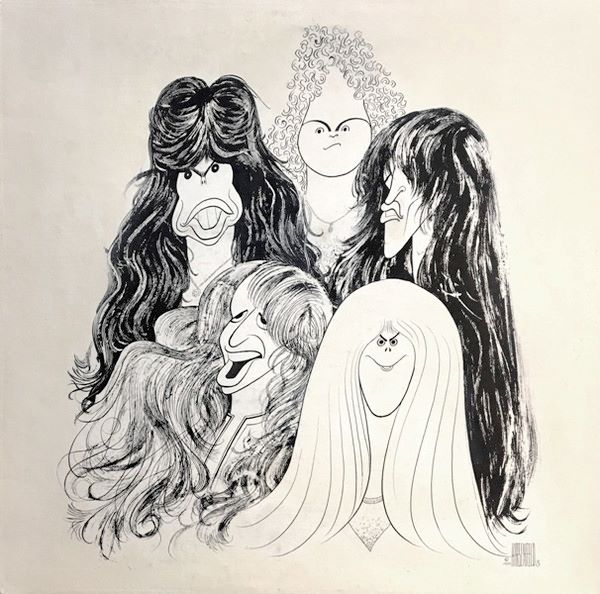
1977
After the fiasco in Europe, AEROSMITH set out on its first tour in Japan at the end of January. It was their custom before every show to demand a Thanksgiving-style roast turkey, as well as numerous bottles of alcohol. Before the first concert in Japan, the band members decided to demolish the backstage because according to their rider, the turkey delivered by the promoter, wasn’t up to their standards. According to Japanese etiquette, the rest of the tour could be canceled. Fortunately, the band played the rest of the scheduled shows without any other international scandals, but it took quite a long time for AEROSMITH to be invited back to Japan.
Their popularity still continued to rise in the US and the band faced another challenge to record a new album as quickly as possible. The AEROSMITH manager decided that due to the drug and alcohol abuse and the exhaustion of constant travel, it would be better at this point to allow them to take a break. When the time came to start working on the new album, band manager David Krebs decided to move the musicians to a quieter environment and leave Manhattan for some time. AEROSMITH, along with producer Jack Douglas and tons of very expensive recording equipment, moved to the village of Armonk in northern New York to a huge convent, known as The Cenacle. In one interview, Joe Perry described this period: “Sixty acres with a great big house. The Record Plant installed a studio there for us, literally installed a whole studio. I don’t know how much it cost us, but it was outrageous. They had a bar and people to serve and I’d wake up at four or five in the afternoon and say, ‘One Black Russian, please.’ We had motorcycles and Porsches and we’d go cruising around the countryside terrorizing everybody. We had all our friends up there and we’d go shooting off all these guns at the shooting range, just blasting away… We had a great time up there.” Much of the spring and summer was spent waiting for the band’s new material. Perry had managed to lose the only copy of a tape he had of six demo recordings that he’d written for the album, and unfortunately, he didn’t remember any of the tunes.
“Steven and Joe just weren’t available. We were still working. We got up early in the morning, so Joey and Tom and I spent a lot of time together.”
(BRAD WHITFORD)
In AEROSMITH, it had become a tradition that Steven Tyler wrote the lyrics. He spent most of his time locked in the convent’s tower with a shotgun to shoot animals inhabiting the grounds. He even fainted once, while leaning on a loaded gun. After some time, the band was asked for a particular result of their creation so far; at that point, it was far from impressive. Joe Perry and Steven Tyler spent time locked in their rooms consuming anything and everything while the other three members were working hard and jamming in the studio. Brad Whitford explains: “Steven and Joe just weren’t available. We were still working. We got up early in the morning, so Joey and Tom and I spent a lot of time together.” One example, the progressive instrumental “Krawhitham”, later released on “Pandora’s Box” in 1991, presents some evidence of how important the three less conspicuous members are. AEROSMITH’s management tried for another chance, and in the summer sent the band to a series of festival performances in Europe with the hope that festivals would be more productive and less costly than the previous trip. Unfortunately, this did not work out either. The press reacted very negatively towards the band and especially about their behavior and the heavy-handed tactics of their overprotective crew. Consequently, AEROSMITH did not appear in Europe for the next decade.
In the US, however, they still maintained the status of a first-league band. “Draw the Line” was released on December 1, 1977, and became a platinum record earlier than any of their previous releases. Hard to keep the standard set with previous albums. Joe Perry admits that he likes the album, but he is aware that it is not as good as “Rocks”. Brad Whitford adds that he still has the demo they recorded while jamming in the studio, and there are some great songs on it, but unfortunately, they did not appear on the record. The most powerful moments are in the energetic title “Draw the Line”, and medieval history inspired by the story of the Vikings, the Holy Wars and the bloodthirsty Englishmen, “Kings and Queens”. AEROSMITH also included the cover version of “Milk Cow Blues” on the album, played by Tom Hamilton and Joe Perry in JAM BAND. This was originally written by the American bluesman James “Kokomo” Arnold in 1935. What definitely worked perfectly is the cover of the album, which is a funny band cartoon from artist Al Hirschfeld.

1978–1979
In 1978, AEROSMITH did not come up with any new studio album, but the band did not disappear from the public eye and participated in various projects. On March 18, 1978 they appeared as the headliners of California’s biggest festival of the decade, performing in front of 350,000 fans. On Independence Day, July 4, 1978, AEROSMITH were headlining the Texxas Jam 78 festival at the Cotton Bowl in Dallas. The entire performance was recorded, and officially released on a videotape in 1989. In July, they appeared in the independent movie “Sgt. Pepper’s Lonely Hearts Club”, directed by Michael Schultz, with the cover version of the BEATLES – “Come Together”. The movie is inspired by the self-titled BEATLES album. In addition to AEROSMITH, other stars such as the BEE GEES also appeared in the movie and on the soundtrack as well. This was a great opportunity for the band to record alongside the famous producer of the BEATLES, George Martin. A small club tour was planned for the summer, but eventually only two stops in Los Angeles and Boston actually happened. The tour continued at stadiums and venues with the biggest possible capacity to reach the widest possible audience. The whole tour ended in early 1979. On October 27, 1978, the first live AEROSMITH double album “Live! Bootleg”, was released, featuring concert performances within the years 1973–1978.
Relationships in the band were tense, and hostility was high, especially between Steven Tyler and Joe Perry, who almost did not communicate with each other at all. It was only a matter of time before the situation escalated completely. AEROSMITH returned to Wherehouse in Waltham to begin pre-production work before heading to Media Sound Studio in Manhattan. Symbolically, the sixth member of the band, Jack Douglas, this time does not appear as the producer. The management of AEROSMTH decided to hire Gary Lyons, who produced, for example, FOREIGNER and HUMBLE PIE. He was hired mainly to reduce recording and production costs because he was able to do both himself.
The hostility between Tyler and Perry was so strained that they could not be together in the studio. First, Joe Perry recorded his parts and then Steven Tyler appeared to work on lyrics and melodies. In the end, the management plan did not work out mainly because of Steven Tyler’s drug addiction, and the subsequent rapid increase in the budget. The only solution to save the overall situation was to stop the recording process and send the band on tour. Joe Perry did not return to the studio with AEROSMITH. After meeting with management, he agreed to release a solo album due to his debt to the band / management of $100,000. He said they had his parts recorded so they could use them or erase them. He called Tom Hamilton to announce his official departure from the band.
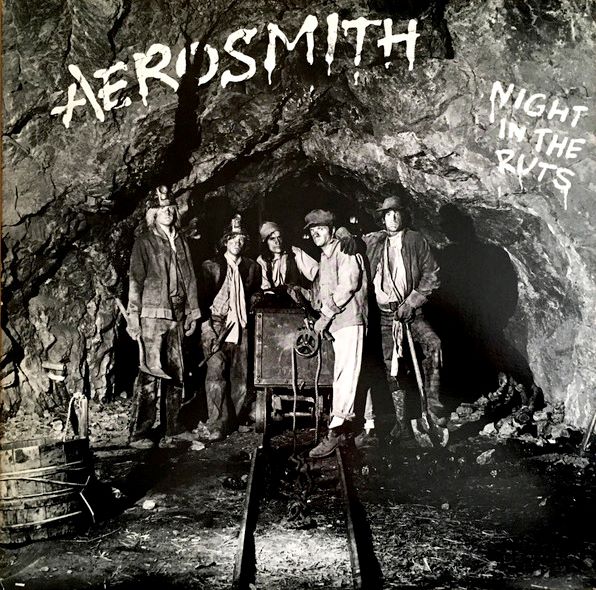
AEROSMITH had to finish the album and invited a few guests to the recording – Richie Sup, guitarist Neil Thompson, and a possible replacement for Joe Perry, guitarist Jimmy Crespo. Even one of the possible replacements was the SCORPIONS / UFO guitarist, Michael Schenker. Although the circumstances of the process ranged from quite chaotic to dramatic, the result was better than expected. “Night in the Ruts” finally saw the light of day on November 1, 1979. The band probably faced a lack of creativity and new ideas due to all the circumstances, so there are only six original songs and three cover versions on the album of nine songs. Tyler’s fabulous performance of the soul song “Remember Walking in the Sand” (THE SHANGRI-LAS), to which he adds, “THE SHANGRI-LAS has always been one of my favorite bands.”
Cover version number two, “Reefer Head Woman” (MELROSE, BUNNETT, GILLUM – blues from 1945), a slower piece accompanied by an accordion and an authentic vocal of Tyler that perfectly fits Perry’s solo. The last cover version is “Think About It” (THE YARDBIRDS), in which drummer Joey Kramer did a very precise job. AEROSMITH justifiably honored the trio: Relf / McCarty / Page. One of the original things on the album is Tyler’s personal confession to his newborn daughter, named after her – “Mia”. At that time, he had no idea about Liv, who was born a year earlier, and so for several more years considered Mia as his firstborn daughter. While many speculate about the lack of original material on the album “Night in the Ruts”, the album is definitely among the most underrated albums. But the fans will remember this record as the one when the band broke up.
Meanwhile, Joe Perry was working on his solo project and his first performance with the new band took place just six weeks after leaving AEROSMITH. The concert took place on November 16, 1979 at the Rathskellar College Club and was attended by only a few hundred fans, mostly teenagers. Even Steven Tyler was spotted in the crowd, but he left before Joe Perry and the band appeared on stage. However, Brad Whitford stayed for the whole show. Joe Perry was definitely not idle, and with the JOE PERRY PROJECT, he released three relatively successful albums during his absence from AEROSMITH and was, for example, performing with big bands as ZZ TOP. He had a solo album in his head for several years. Due to continuous activities with AEROSMITH, he hadn’t had the time for it before.
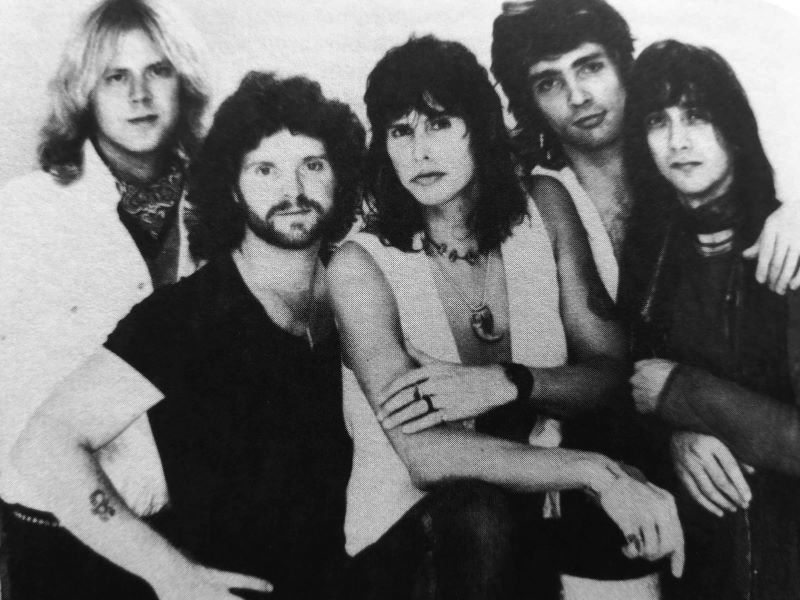
1980–1984
The situation around unbridled front man Steven Tyler was quite chaotic. His drug addiction was at a stage where he totally lost control of himself. Due to his addiction, the band’s budget was rapidly shrinking, and Steven became one of the hottest candidates among celebrities who might soon be on the dead list. Fortunately, these prophecies did not come true. After a motorcycle accident one night, he had his heel separation. He was extremely lucky he hadn’t killed himself. He spent the next six months in hospital after surgery. So, it was clear that the new album would have to wait, and it would take some time before the band was able to get together and create. Meanwhile, Brad Whitford was working on his solo project WHITFORD / HOLMES with TED NUGENT ex-guitarist, Derek St. Holmes. They were able to complete the album in just two weeks.
In 1981, the situation in the band was so intense that even Brad Whitford would decide to leave AEROSMITH because he was fed up with a period of doing nothing, chaos and uncertainty. He was replaced by unknown musician Rick Dufay. AEROSMITH was working on new songs at Wherehouse, Boston, initially without Steven Tyler, sending him tapes for his feedback. When Steven Tyler was relatively capable of working, AEROSMITH started to work on a new album at Criteria Studios in Miami, Florida. As a producer Tony Bongiovi was initially hired. He was a cousin of Jon Bon Jovi. After a while, the band called back their old friend Jack Douglas to get things right.
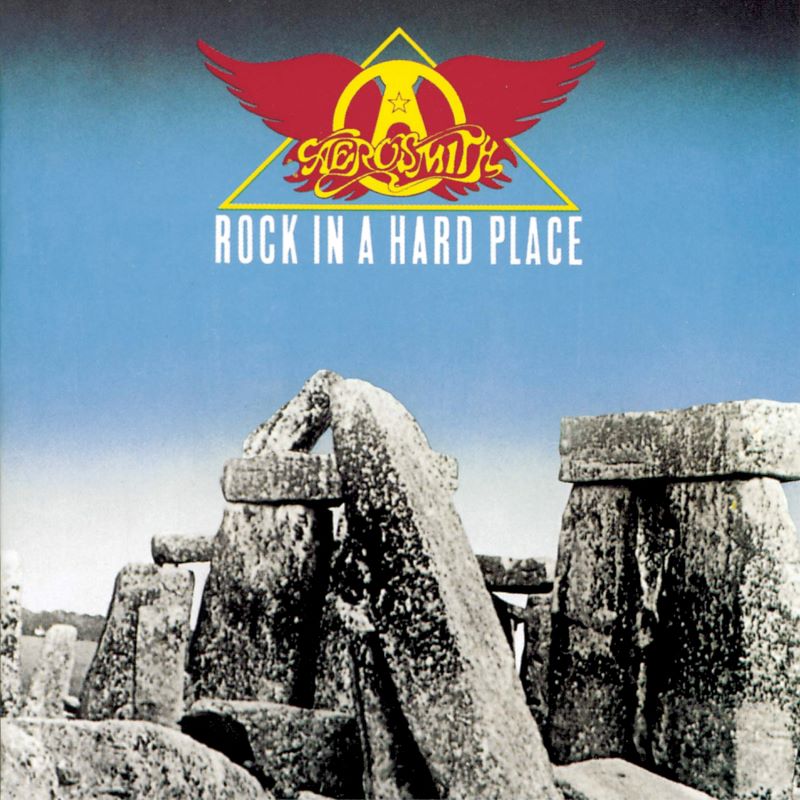
The ‘new wave’ style didn’t resonate with the band at all. After overcoming obstacles that seemed to be impossible to sort out, the album “Rock in a Hard Place” was finally released on August 1, 1982, and it is definitely the one that deserves respect. AEROSMITH are often associated with THE ROLLING STONES in connection with the alleged copying of their music and the visual similarity between Tyler and Jagger. Looking at the title of this album, I wonder if the Stones maybe couldn’t have been inspired by AEROSMITH when they released the song “Rock and a Hard Place” on their “Steel Wheels” album, released in 1989. Maybe it was just a coincidence. Jimmy Crespo, who replaced Joe Perry for a few years, is credited as an author on the album for six songs out of ten. The opening “Jailbait”, which came out of Tyler / Crespo’s collaboration, kept the energy and standard that we are used to from previous AEROSMITH albums. Jimmy Crespo’s guitar sound is more distortive compared to Joe Perry’s sound, used more in heavy metal than in 1970s rock and roll. It is followed by the anthem “Lightning Strikes”, which appeared as the first AEROSMITH MTV video, with the solo recorded by Brad Whitford, shortly before leaving the band. Cover versions were represented by only one song “Cry Me a River”, which closes the whole album. After that, the band didn’t perform together for more than two and a half years. It was necessary to get into shape, and therefore it was necessary to rehearse longer. AEROSMITH moved to the Concord Theater in New Hampshire where they rehearsed and held parties for two months.
The tour started in the fall of 1982 and continued into 1984. Although AEROSMITH had the chance to play several big and important gigs, the band was facing huge obstacles. AEROSMITH was experiencing a very difficult period. Steven Tyler was doing very badly and collapsed regularly during the shows. Management tried to keep him away from fans and people who would deliver him even more drugs except those he got for himself. Jimmy Crespo shared the creative side of the new album with him, but he was not as committed to drugs as Steven. He squeezed out with Rick Dufay and together they were literally a disaster for the rest of the band and the crew. The reactions of the fans were not so overwhelming either. Steven Tyler was aware that AEROSMITH without Joe Perry and Brad Whitford was not the same anymore. Steven missed Joe more and more and wanted him back, even though he thought this chapter was closed, and their relationship had been buried forever. Exactly on Valentine’s Day in 1984, they all finally met together after a long time. It happened backstage following one of the AEROSMITH shows after Steven Tyler had called Joe Perry and invited him to come. Joe Perry in his autobiography “Rocks” remembers Steven calling him after a long time. It was at a time when Joe was already sharing a household with the love of his life, Billie. It was she who persuaded him to meet together after all the years they played together and after all they achieved together. Of course, Joe wanted to show off his beautiful partner and introduce her to everyone. And he adds: “The meeting after such a long time was very pleasant. Steven was charming and funny.” But there were still a lot of unspoken and unresolved issues hanging in the air, so the comeback had to wait for another time.
